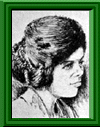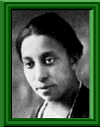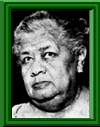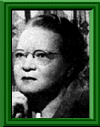




















The Howard Nine




















 Marjorie Hill entered the School of Arts and Sciences of Howard University in the fall of 1904. She was present at the inaugural meeting of the proposed sorority on January 15, 1908, and was one of the founders of Alpha Kappa Alpha Sorority. She has been described by her associates as quiet and unassuming and always willing to help when a job had to be done. Ms. Hill graduated in 1908 with a Bachelor of Arts degree. Marjorie Hill died in the summer of 1909, but was remembered by her classmates for her willingness to participate in sorority events and her skill with day-to-day organization. She was the first Alpha Kappa Alpha member to become an "Ivy Beyond the Wall."
Marjorie Hill entered the School of Arts and Sciences of Howard University in the fall of 1904. She was present at the inaugural meeting of the proposed sorority on January 15, 1908, and was one of the founders of Alpha Kappa Alpha Sorority. She has been described by her associates as quiet and unassuming and always willing to help when a job had to be done. Ms. Hill graduated in 1908 with a Bachelor of Arts degree. Marjorie Hill died in the summer of 1909, but was remembered by her classmates for her willingness to participate in sorority events and her skill with day-to-day organization. She was the first Alpha Kappa Alpha member to become an "Ivy Beyond the Wall."




















 Lucy Diggs Slowe became the first woman graduate of the Baltimore Colored High School to enter Howard University. She was also the first graduate from her high school to receive a college scholarship. At Howard, Ms. Slowe was a very industrious student and would rise early in the morning to study before classes. She was so well thought of by the faculty and by her peers, that during her senior year she was trusted to chaperone the Miner Hall girls in the reception room and on downtown shopping tours. Ms. Slowe was an active and enthusiastic member of the founding group of Alpha Kappa Alpha. Her assignment was to prepare the first draft of the constitution, and the document finally adopted was developed from her draft by Margaret Flagg, Lavinia Norman and Ethel Hedgeman. She did graduate work at Columbia University and received the master's degree in 1915. From 1915 to 1919, she taught at Armstrong High School in the District of Columbia and served one year as dean of girls. The quality of her work was soon recognized. In September 1919, Ms. Slowe was requested by the board of education to organize the first junior high school in the District of Columbia. She was appointed principal of this school, Shaw junior School, and served in that position until June 1922.
In 1922, Ms. Slowe became the first dean of women at Howard University, a position she held until her death in 1937. Lucy Diggs Slowe died on October 21, 1937 after an illness of two months. Two buildings located in Washington, D.C. have been named for her: the Lucy Diggs Slowe Hall of Howard University and the Lucy Diggs Slowe Elementary School.
Lucy Diggs Slowe became the first woman graduate of the Baltimore Colored High School to enter Howard University. She was also the first graduate from her high school to receive a college scholarship. At Howard, Ms. Slowe was a very industrious student and would rise early in the morning to study before classes. She was so well thought of by the faculty and by her peers, that during her senior year she was trusted to chaperone the Miner Hall girls in the reception room and on downtown shopping tours. Ms. Slowe was an active and enthusiastic member of the founding group of Alpha Kappa Alpha. Her assignment was to prepare the first draft of the constitution, and the document finally adopted was developed from her draft by Margaret Flagg, Lavinia Norman and Ethel Hedgeman. She did graduate work at Columbia University and received the master's degree in 1915. From 1915 to 1919, she taught at Armstrong High School in the District of Columbia and served one year as dean of girls. The quality of her work was soon recognized. In September 1919, Ms. Slowe was requested by the board of education to organize the first junior high school in the District of Columbia. She was appointed principal of this school, Shaw junior School, and served in that position until June 1922.
In 1922, Ms. Slowe became the first dean of women at Howard University, a position she held until her death in 1937. Lucy Diggs Slowe died on October 21, 1937 after an illness of two months. Two buildings located in Washington, D.C. have been named for her: the Lucy Diggs Slowe Hall of Howard University and the Lucy Diggs Slowe Elementary School.




















 Lillie Burke like her sister, Beulah, Lillie Burke was a founder of Alpha Kappa Alpha Sorority. Ms. Burke attended all preliminary meetings of the proposed sorority and worked with her sister in formulating the motto of Alpha Kappa Alpha Sorority Both young women were accomplished Greek scholars. While in Washington, she helped to organize Xi Omega Chapter in 1923. She was always available as a consultant to the chapter basilei, and her contribution was valuable in the routine functioning of the chapter. She remained an active member of the sorority until her death.
She was a faithful and devoted member of Berean Baptist Church. She liked flowers and could be depended upon to provide lovely floral arrangements in season. Her failing eyesight prevented her from fully participating in civic activities.
Lillie Burke like her sister, Beulah, Lillie Burke was a founder of Alpha Kappa Alpha Sorority. Ms. Burke attended all preliminary meetings of the proposed sorority and worked with her sister in formulating the motto of Alpha Kappa Alpha Sorority Both young women were accomplished Greek scholars. While in Washington, she helped to organize Xi Omega Chapter in 1923. She was always available as a consultant to the chapter basilei, and her contribution was valuable in the routine functioning of the chapter. She remained an active member of the sorority until her death.
She was a faithful and devoted member of Berean Baptist Church. She liked flowers and could be depended upon to provide lovely floral arrangements in season. Her failing eyesight prevented her from fully participating in civic activities.




















 When Ethel Hedgeman returned from her summer vacation in 1907, she was very eager to start a sorority. Perhaps this was partly the result of discussions with her childhood sweetheart, George Lyle, a member of Alpha Phi Alpha Fraternity. But she minimized this influence and at one time stated that it was the encouragement of two faculty members, Miss Ethel Aremain Robinson and Miss Elizabeth Appa Cook that stimulated her interest in the establishment of a sorority Through the fall months, she discussed her ideas with her fellow students, especially with her special friends, the Burke sisters. Eight young women, Beulah and Lillie Burke, Margaret Flagg (Holmes), Lavinia Norman, Lucy Slowe, Anna Brown, Marie Woolfolk (Taylor), and Marjorie Hill joined Ethel Hedgeman, January 15, 1908, and began the planning which culminated in the establishment of Alpha Kappa Alpha Sorority.
Though Ethel Hedgeman was the natural choice for first president, she could not be elected according to the newly accepted constitution because she was a junior. in the fall semester of her senior year, Ethel Hedgeman was elected the second basileus of the first chapter of Alpha Kappa Alpha Sorority.
When Ethel Hedgeman returned from her summer vacation in 1907, she was very eager to start a sorority. Perhaps this was partly the result of discussions with her childhood sweetheart, George Lyle, a member of Alpha Phi Alpha Fraternity. But she minimized this influence and at one time stated that it was the encouragement of two faculty members, Miss Ethel Aremain Robinson and Miss Elizabeth Appa Cook that stimulated her interest in the establishment of a sorority Through the fall months, she discussed her ideas with her fellow students, especially with her special friends, the Burke sisters. Eight young women, Beulah and Lillie Burke, Margaret Flagg (Holmes), Lavinia Norman, Lucy Slowe, Anna Brown, Marie Woolfolk (Taylor), and Marjorie Hill joined Ethel Hedgeman, January 15, 1908, and began the planning which culminated in the establishment of Alpha Kappa Alpha Sorority.
Though Ethel Hedgeman was the natural choice for first president, she could not be elected according to the newly accepted constitution because she was a junior. in the fall semester of her senior year, Ethel Hedgeman was elected the second basileus of the first chapter of Alpha Kappa Alpha Sorority.




















 Marie Woolfolk Taylor participated actively in the planning and organization of Alpha Kappa Alpha. She was present at the inaugural meeting, January 15, 1908, and along with Ethel Hedgeman, was delegated to present the plans for the establishment of the sorority to university officials. These two young women submitted copies of the proposed constitution to the president of Howard University, Wilbur P Thirkield, and to the deans, Lewis Moore and Kelly Miller. Ms. Woolfolk was the spokesman and made her presentation so well, that the constitution was approved and Alpha Kappa Alpha was recognized by the university administration as an official campus organization. At a follow-up meeting on February 21, officers were elected and Marie Woolfolk became the first secretary of Alpha Kappa Alpha.
She was chosen to approach members of the sophomore class who had shown an interest in joining the sorority and who had been selected for membership by Beulah Burke. The new members were added without initiation. Marie Woolfolk Taylor died on November 9, 1960 and is buried in Atlanta, Georgia.
Marie Woolfolk Taylor participated actively in the planning and organization of Alpha Kappa Alpha. She was present at the inaugural meeting, January 15, 1908, and along with Ethel Hedgeman, was delegated to present the plans for the establishment of the sorority to university officials. These two young women submitted copies of the proposed constitution to the president of Howard University, Wilbur P Thirkield, and to the deans, Lewis Moore and Kelly Miller. Ms. Woolfolk was the spokesman and made her presentation so well, that the constitution was approved and Alpha Kappa Alpha was recognized by the university administration as an official campus organization. At a follow-up meeting on February 21, officers were elected and Marie Woolfolk became the first secretary of Alpha Kappa Alpha.
She was chosen to approach members of the sophomore class who had shown an interest in joining the sorority and who had been selected for membership by Beulah Burke. The new members were added without initiation. Marie Woolfolk Taylor died on November 9, 1960 and is buried in Atlanta, Georgia.




















 Beulah E. Burke was one of the most active of the founders of Alpha Kappa Alpha Sorority both during the period of incorporation as well as at the time of the original establishment and provided wise counsel throughout her 67 years of membership. In 1913, when Nellie Quander was considering the incorporation of the sorority to preserve its name and integrity for all time, Ms. Burke was contacted to help in nationalizing the sorority because of her strong support for this step. She chartered the first three chapters after incorporation: Beta Chapter in Chicago (1913), Gamma Chapter at the University of Illinois (1913), and Delta Chapter at the University of Kansas (1914).
Ms. Burke contributed further to the development of Alpha Kappa Alpha as a national organization by establishing additional graduate chapters. In 1920, she established Beta Omega Chapter in Kansas City, Missouri, and in 1922, Mu Omega Chapter in Kansas City, Kansas. She served as basileus of both chapters. She was also hostess basileus at the Kansas City Boule of 1922. From 1923 to 1924, she served as second supreme anti-basileus. In 1925, she was elected Midwestern organizer (regional director). She attended and contributed to many other Boules and on the occasion of the 50th Anniversary Boule in 1958 had this to say:
Beulah E. Burke was one of the most active of the founders of Alpha Kappa Alpha Sorority both during the period of incorporation as well as at the time of the original establishment and provided wise counsel throughout her 67 years of membership. In 1913, when Nellie Quander was considering the incorporation of the sorority to preserve its name and integrity for all time, Ms. Burke was contacted to help in nationalizing the sorority because of her strong support for this step. She chartered the first three chapters after incorporation: Beta Chapter in Chicago (1913), Gamma Chapter at the University of Illinois (1913), and Delta Chapter at the University of Kansas (1914).
Ms. Burke contributed further to the development of Alpha Kappa Alpha as a national organization by establishing additional graduate chapters. In 1920, she established Beta Omega Chapter in Kansas City, Missouri, and in 1922, Mu Omega Chapter in Kansas City, Kansas. She served as basileus of both chapters. She was also hostess basileus at the Kansas City Boule of 1922. From 1923 to 1924, she served as second supreme anti-basileus. In 1925, she was elected Midwestern organizer (regional director). She attended and contributed to many other Boules and on the occasion of the 50th Anniversary Boule in 1958 had this to say:
"I think fundamentally we should regard our fiftieth anniversary as just another milestone in our history - as another opportunity to rededicate ourselves to the high purposes which have been emphasized and reemphasized throughout the history of Alpha Kappa Alpha Sorority.In 1968, she was honored at the 60th anniversary celebration of Founders' Day in Washington at a special banquet where Norma Boyd and Lavinia Norman were the other featured guests. Her faithful friends in Xi Omega Chapter knew her as a loyal Alpha Kappa Alpha woman - a good person who always helped people and shared her all with anyone whom she found in need. Beulah Elizabeth Burke died on April 8, 1975 in Washington, D.C. She is buried in Lincoln Cemetery.




















 Margaret Flagg Holmes along with Ethel Hedgeman and Lavinia Norman, developed the constitution as initially drafted by Lucy Diggs Slowe. From 1922 to 1953, Mrs. Holmes was an active member of Theta Omega Chapter in Chicago. She served as anti-basileus and grammateus of the chapter and attended several Boules as a delegate from her chapter.
In 1953, she retired from teaching and, having been widowed in 1946, moved to New York City to live with her sister. There she affiliated with Tau Omega Chapter in Manhattan.
In 1968, she was guest of honor at the 19th annual joint Founders' Day celebration of the chapters of greater New York. In response to her tribute delivered by Thelma Berlack Boozer, the first elected North Atlantic regional director, Mrs. Holmes stated that her philosophy of life was: "Life is for the living . to love, to share and give of one's self."
She wrote of her experiences as a member of Alpha Kappa Alpha with much affection:
Margaret Flagg Holmes along with Ethel Hedgeman and Lavinia Norman, developed the constitution as initially drafted by Lucy Diggs Slowe. From 1922 to 1953, Mrs. Holmes was an active member of Theta Omega Chapter in Chicago. She served as anti-basileus and grammateus of the chapter and attended several Boules as a delegate from her chapter.
In 1953, she retired from teaching and, having been widowed in 1946, moved to New York City to live with her sister. There she affiliated with Tau Omega Chapter in Manhattan.
In 1968, she was guest of honor at the 19th annual joint Founders' Day celebration of the chapters of greater New York. In response to her tribute delivered by Thelma Berlack Boozer, the first elected North Atlantic regional director, Mrs. Holmes stated that her philosophy of life was: "Life is for the living . to love, to share and give of one's self."
She wrote of her experiences as a member of Alpha Kappa Alpha with much affection:
"It is with a feeling of justifiable pride that I am happy to be a founder of this organization which has many wonderful, talented, dedicated women who are contributing much to the world of today - a world which is so sadly in need of the talent, common sense and humanity of women." Margaret Flagg Holmes died January 29, 1976, thirty years after her beloved husband. She was beloved by the sorors of Tau Omega Chapter in the metropolitan New York area as well as those of the North Atlantic Region. She made an impact upon those who were to become the future leaders of the sorority.




















 Lavinia Norman was born in Montgomery, West Virginia. She entered the preparatory department of Howard University in 1901, prepared to study not only her assigned courses, but as many other subjects as her instructors would permit. There were few women enrolled at Howard at that time, and she remembers that in her junior year, she and Ethel Hedgeman were the only girls in her college class.
She was very interested in the idea of a sorority and attended all the planning meetings preliminary to the formal organization. With Margaret Flagg and Ethel Hedgeman, she developed the first constitution of Alpha Kappa Alpha from a draft by Lucy Slowe. In 1909, Lavinia Norman succeeded Ethel Hedgeman as president of Alpha Kappa Alpha Sorority While in office, she presided over the second Ivy Day exercises and explained the aims and ideals of the sorority to those present.
Ms. Norman taught at the Douglass High School in Huntington, West Virginia from 1909 until 1950 when she retired. At various times she taught grades four through eight. She also supervised the publication of the Douglass High School newspaper.
While devoting herself to her students, Lavinia Norman did not forget the importance of continuing her own education. She enrolled in West Virginia State College where she earned a second bachelor's degree in 1934.
While living in Huntington, Ms. Norman was an active member of Beta Tau Omega Chapter. She served in many capacities - secretary, speaker for Founders' Day observances, a member of the Entertainment Committee, director of chapter plays, and in other valuable ways.
Upon her retirement in 1950, she returned to Washington, D.C. where she affiliated with Xi Omega Chapter. For over thirty years she was a legendary, revered and cherished member of Alpha Kappa Alpha Sorority. On December 14, 1982, her 100th birthday was celebrated with a gala party.
Lavinia Norman died in Washington, D.C. on January 22, 1983. The following day, a memorial service was held in the Andrew Rankin Chapel of Howard University.
Lavinia Norman was born in Montgomery, West Virginia. She entered the preparatory department of Howard University in 1901, prepared to study not only her assigned courses, but as many other subjects as her instructors would permit. There were few women enrolled at Howard at that time, and she remembers that in her junior year, she and Ethel Hedgeman were the only girls in her college class.
She was very interested in the idea of a sorority and attended all the planning meetings preliminary to the formal organization. With Margaret Flagg and Ethel Hedgeman, she developed the first constitution of Alpha Kappa Alpha from a draft by Lucy Slowe. In 1909, Lavinia Norman succeeded Ethel Hedgeman as president of Alpha Kappa Alpha Sorority While in office, she presided over the second Ivy Day exercises and explained the aims and ideals of the sorority to those present.
Ms. Norman taught at the Douglass High School in Huntington, West Virginia from 1909 until 1950 when she retired. At various times she taught grades four through eight. She also supervised the publication of the Douglass High School newspaper.
While devoting herself to her students, Lavinia Norman did not forget the importance of continuing her own education. She enrolled in West Virginia State College where she earned a second bachelor's degree in 1934.
While living in Huntington, Ms. Norman was an active member of Beta Tau Omega Chapter. She served in many capacities - secretary, speaker for Founders' Day observances, a member of the Entertainment Committee, director of chapter plays, and in other valuable ways.
Upon her retirement in 1950, she returned to Washington, D.C. where she affiliated with Xi Omega Chapter. For over thirty years she was a legendary, revered and cherished member of Alpha Kappa Alpha Sorority. On December 14, 1982, her 100th birthday was celebrated with a gala party.
Lavinia Norman died in Washington, D.C. on January 22, 1983. The following day, a memorial service was held in the Andrew Rankin Chapel of Howard University.




















SOPHOMORES
INCORPORATORS
HOME
Email Webmistress